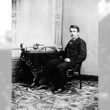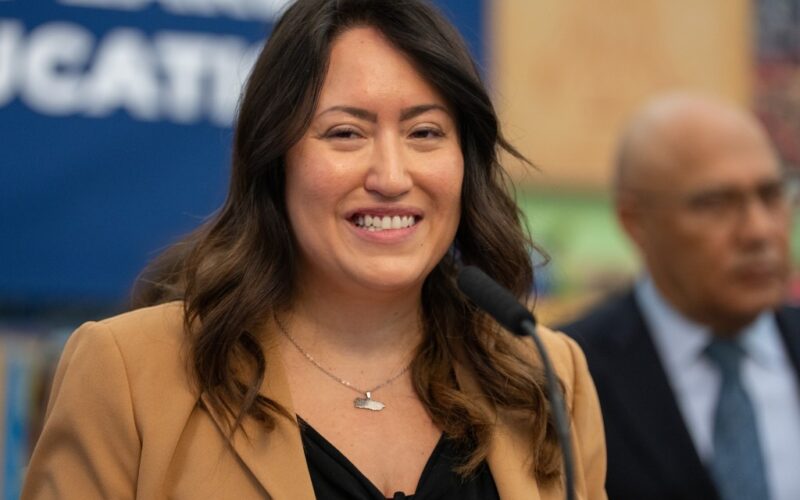The day after her boss Mayor Adams dropped out of the New York City mayoral election, Schools Chancellor Melissa Aviles-Ramos on Monday announced the expansion of a pilot program on student homelessness ballyhooed by the race’s front-runner, Zohran Mamdani.
The initiative, “Every Child and Family is Known,” connects Bronx students living in shelters one-on-one with school staffers known as “Caring Adults.” For the first time this school year, it will spread to 125 schools across the five boroughs, the chancellor revealed during her 2025 State of Our Schools address.
It’s one of the few K-12 school programs Mamdani, if elected, has already announced he would seek to expand as part of his education agenda. Nearly 1 in 8 city school students do not have stable housing, according to data last school year.
“This has been in the works for a really long time,” Aviles-Ramos said after the speech at the Manhattan Center for Science and Mathematics in East Harlem. “It started in District 9 in the Bronx. And the reason why it started, we wanted to make sure that children who are in temporary housing — and their family — have the support that they needed.”
“We want to make sure that every one of our children has that one person, that one caring adult,” she added.
The chancellor also announced new initiatives in English language classes, artificial intelligence, and a public dashboard where families can track school safety, repairs, and other data in real-time, as she serves what will likely be her last few months in the role under Adams.
Mamdani-backed plan
In a race to not only lead the city, but also take the reins of the nation’s largest school district, Mamdani, the Democratic nominee, has yet to release an official K-12 education plan — an absence that Andrew Cuomo, the former-governor-turned-underdog in the race, has tried to capitalize on.
Mamdani has, however, previewed some of his ideas for the city’s public schools in one paragraph on his campaign’s website, including to expand Every Child and Family is Known.
Through the program, children living in shelters meet each day with existing school staffers, who also hold weekly in-person meetings with their families. The employees are expected to have a prior relationship with the student, speak their home language, and log their interactions in an online portal. Schools must have at least 10 children in temporary housing to qualify for the initiative.
Barry Williams/ New York Daily News
Zohran Mamdani campaigns in Upper Manhattan on Monday. (Barry Williams/ New York Daily News)
“Better outcomes,” Mamdani told the New York Editorial Board in January, “are not always directly related to additional investment. They also have to do with prioritization. They also have to do with follow-through.”
He gave Every Child and Family is Known as an example of a program “that doesn’t have that much of a fiscal cost, but the benefits are immense.”
“That kind of a connection and prioritization has had immense outcomes for students, not only retention in those classes, but also the connection between them and school-life, that of their families.”
His campaign did not immediately return a request for comment on Monday.
The city is currently spending close to $1.3 million on the program, which runs through the end of the calendar year, according to budget documents. The funding primarily covers per-session and overtime costs for staff to participate in the initiative outside of their regular work hours.
The total number of schools participating grew from 110 to 125 this year, according to education officials. While some Bronx schools had low levels of participation last year and were not renewed for funding, 26 schools were selected for the first time.
The vast majority of schools are in the Bronx, the documents show. Sixteen are in Brooklyn, a half dozen in Manhattan, and the rest in Queens and on Staten Island.
English language learners, AI and transparency
During the event Monday, which featured a marching band, cheerleaders, and several speakers, Aviles-Ramos also announced the expansion of the Adams administration’s signature literacy initiative, “NYC Reads,” to students learning English.
As part of a pilot, 80 schools will use one of two standardized English language development curricula: “English 3D” and “National Geographic Reach Higher.”
“Here in New York City, multilingualism is a superpower,” the chancellor said during her speech. “Here in New York City, we know that it’s important to be literate in multiple languages. Here in New York City, we know knowing more than one language should be an expectation and in no way a deficiency.”
“This pilot pairs what we know about how children learn to read with how students acquire a new language.”
The chancellor also released four guiding principals for the school district’s approach to artificial intelligence: Prepare students for AI careers, teach students and staff to use the systems responsibly, mitigate bias, and use AI to make schools and classrooms run more efficiently.
Lastly, she announced a new accountability tool where parents, teachers and advocates can monitor the school system’s progress toward specific educational goals, such as to reduce chronic absenteeism and expand preschool special education classes.








